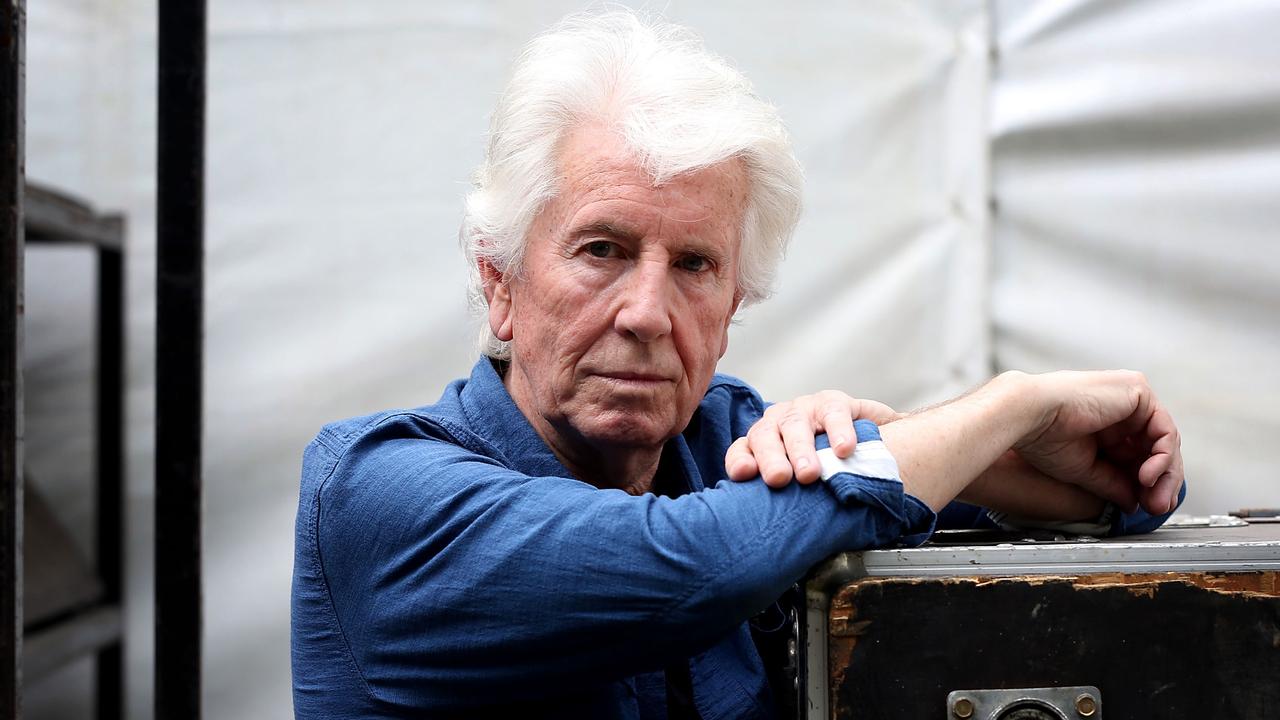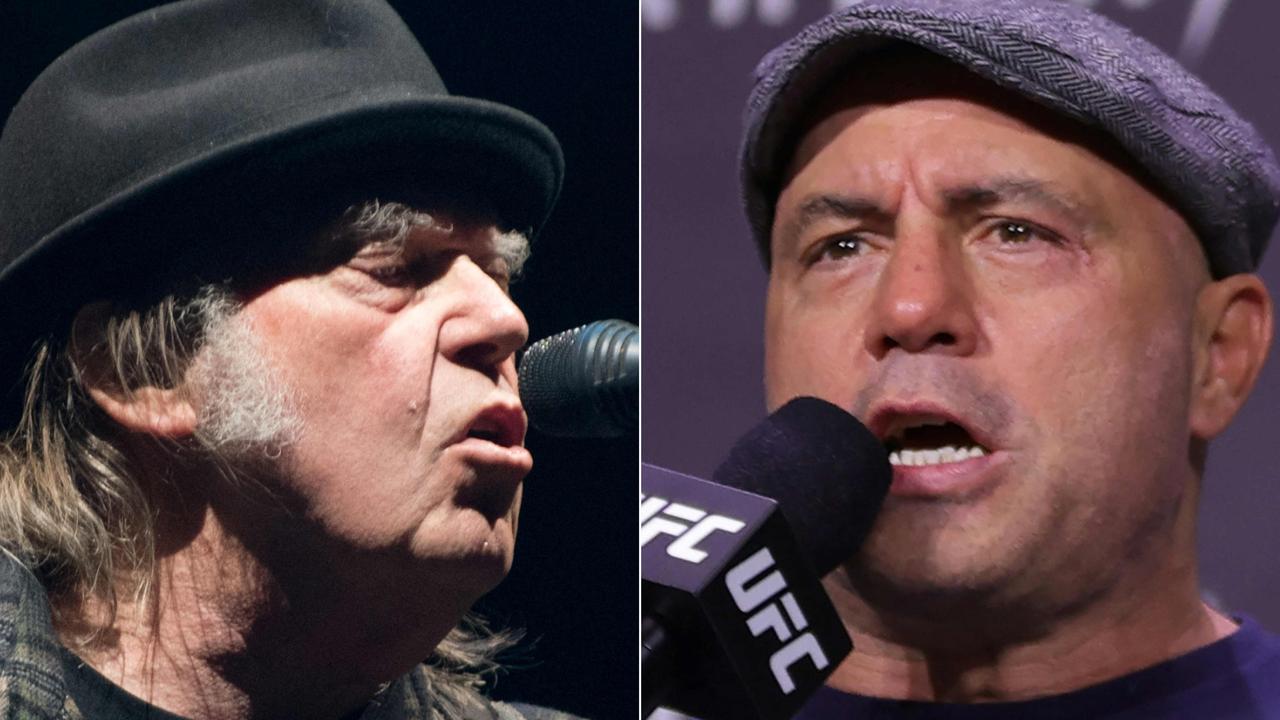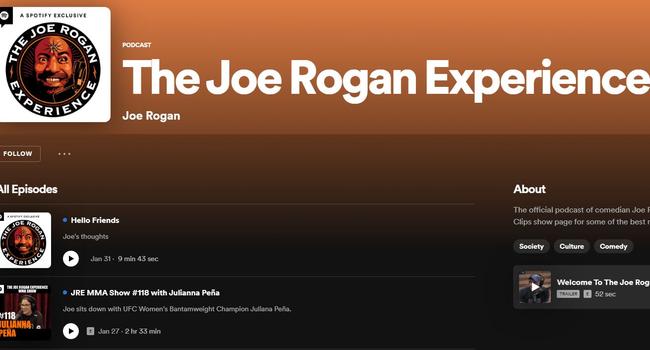More artists join Spotify boycott over Joe Rogan podcast controversy
More artists have joined the boycott of Spotify, calling for their music to be ripped from the streaming service over controversial podcaster Joe Rogan.
Spotify has been hit with another blow as the saga over controversial podcaster Joe Rogan rages on.
Two more artists have asked for their music to be pulled from the streaming service as part of a boycott in response to Covid misinformation being aired by Rogan on his podcast The Joe Rogan Experience.
Now, British singer-songwriter Graham Nash has followed in his former bandmate Neil Young’s footsteps and asked for his music to be removed from Spotify.
“Having heard the Covid disinformation spread by Joe Rogan on Spotify, I completely agree with and support my friend Neil Young and I am requesting that my solo recordings be removed from the service,” Nash said in a statement.
“There is a difference between being open to varying viewpoints on a matter and knowingly spreading false information which some 270 medical professionals have derided as not only false but dangerous.”
Stream more entertainment news live & on demand with Flash, a dedicated news streaming service. New to Flash? Try 14 days free now >

The Crosby, Stills, Nash & Young singer branded Rogan’s opinions as “dishonest and unsupported by solid facts” and by allowing them to be aired Spotify had become an “enabler in a way that costs people their lives”.
US singer India. Arie is also looking to remove her music and podcasts from the streaming service, citing Rogan’s “Covid interviews,” as well as his “language around race” as the reasons behind the decision.
The latter likely refers to a recent interview where Rogan made offensive comments about African nations and claimed it was “weird” to use the term “Black” as an identifier.
“What I am talking about is RESPECT – who gets it and who doesn’t,” Arie wrote on Instagram.
“Paying musicians a Fraction of a penny? and HIM $100M? This shows the type of company they are and the company that they keep.”
Nash and Ari join legendary songwriter Joni Mitchell in boycotting the streaming giant.
The Joe Rogan/Neil Young controversy explained
Rogan has faced ongoing criticisms of his podcast, The Joe Rogan Experience, after repeatedly using the platform to cast doubt on the safety and effectiveness of the Covid vaccines and air misinformation about the virus.
The backlash really ramped up after he interviewed US cardiologist Peter McCullough and vaccine scientist Dr Robert Malone last month.
Both guests are known for their controversial Covid-19 beliefs and spent hours talking about everything from the efficacy of vaccines, to conspiracy theories on how the pandemic really how the pandemic began and other potential treatments for Covid being “suppressed”.
Rogan was widely condemned for airing dangerous “misinformation”, prompting Young to demand Spotify remove Rogan’s podcast from the platform.
“I am doing this because Spotify is spreading fake information about vaccines, potentially causing death to those who believe the disinformation being spread by them,” he said, specifically citing Rogan’s podcast.

Young gave Spotify an ultimatum, either get rid of Rogan or he will pull his music from the platform.
“Spotify has a responsibility to mitigate the spread of misinformation on its platform, though the company presently has no misinformation policy," he said.
“They can have Rogan or Young. Not both.”
It took Spotify just 48 hours to make its decision, confirming it would be removing Young’s music from the platform.
The company said it regretted the development and hoped to “welcome him back soon”.
Rogan responded to the controversy in a nine-minute video on Monday, with the 54-year-old admitting he “absolutely gets things wrong”.
He also promised viewers he would endeavour to find a “counter” guest shortly after controversial topics were discussed on his podcast.
He insisted his only goal was to interview interesting people on topics of the hour, and claimed much of how he was being perceived came from people forming opinions before actually viewing the podcasts in full.
“I wanted to make this view because I think there is a lot of people who have a distorted perception of what I do, maybe based on sound bites or headlines of disparaging articles.”
Spotify’s $100m motivation for backing Rogan
As the Rogan controversy continues, many have questioned why Spotify was so quick to side with the controversial podcaster over a beloved music legend like Young.
Well, the answer is likely a lot more simple than you might think: Money.
In 2020, Spotify acquired The Joe Rogan Experience in a deal reported to be worth more than $A152 million.
The podcast is now Spotify’s most popular podcast and one of the biggest in the world, with an estimated 11 million listeners per episode.
Despite Rogan repeatedly facing criticisms for his views on Covid-19 and vaccines, the controversy hasn’t stopped it raking in profits for the streaming giant.

Spotify’s focus on expanding its podcast library has been increasingly evident in the past few years, with the service rapidly acquiring companies “in the emerging podcast marketplace”.
In 2019 the company purchased Gimlet Media, home of podcasts such as Reply All, Homecoming and Where Should We Begin? With Esther Perel, for an estimated $230 million ($A325 million).
The company also spent almost $200 million ($A283 million) to buy podcast network The Ringer and also spent more than $100 million ($A141 million) on Anchor, a platform which makes podcast creation software.
Looking at how much money the company has thrown at growing its podcast library and the importance it continues to place on the sector, it really isn’t hard to understand why Spotify wouldn’t want to let go of its most listened to creator – even if it meant losing a classic artist like Neil Young.
More Coverage
John Simson, the program director for the business and entertainment program at American University, told The Washington Post he believes it all comes down to business.
“In the music side of things, [Spotify is] paying out roughly 70 per cent of all the revenue that comes in. It goes right back out as royalties. They’re looking for other places where the revenue split isn’t that dramatic. … Podcasts were certainly their go-to,” he said.
Rogan responds, Spotify announces new rules





